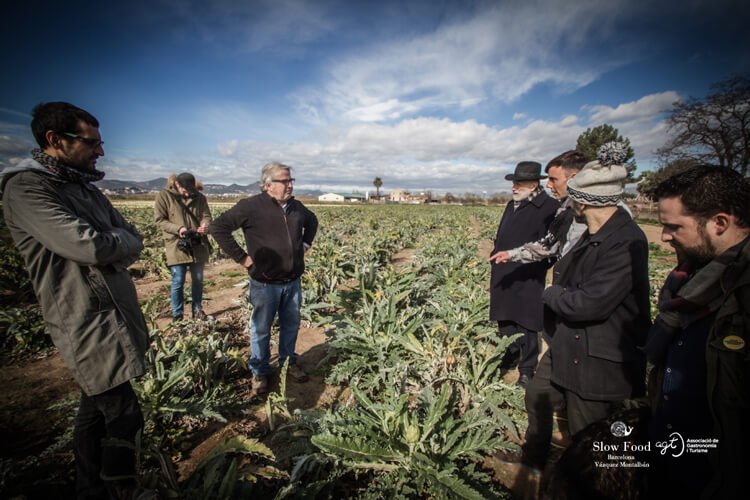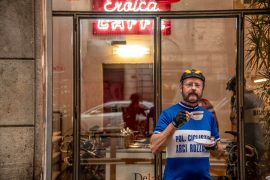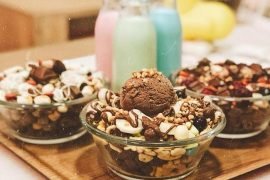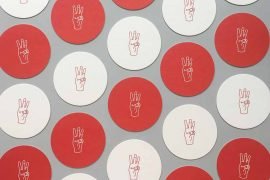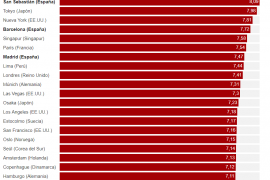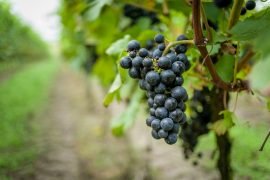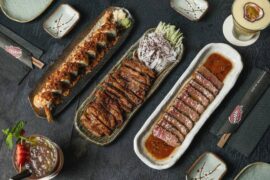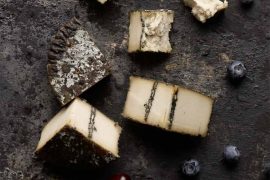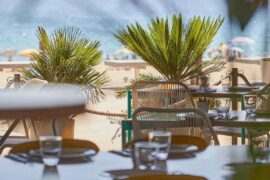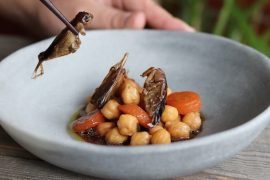In Barcelona, Slow Food Vázquez Montalbán (www.slowfoodbcn.cat) has been around since 2005 and Daniele Rossi has been president for the past 5 years. Over this time, they have worked hard to spread their message to as many people as possible. “The word good is key: when something is good, we buy it again. If it isn’t, we don’t go back and we don’t enjoy it, which is the whole point and what we want to encourage: enjoying what we eat. Clean is more about ecology. The food shouldn’t have any contaminants; it should be as natural as possible but also create as little pollution as possible. The less we have to transport what we eat, the less pollution. And this brings us to the concept of local. We have top-notch products and producers right here around us waiting to create a social fabric that is impossible to establish with large supermarkets. And fair means that all these producers should earn a living wage and, this way, also attract the next generation of producers, which is key.”
These words are the fuel for the Barcelona Slow Food convivium that is gaining momentum thanks mainly to the Mercat de la Terra (farmers’ market) held on Saturdays from 10 am to 4 pm at Jardins de les Tres Xemeneies in Poble Sec.
The market began as a monthly event. “We spent ten years knocking on doors and getting rejected, hearing that selling things on the street isn’t allowed in Barcelona, even as a regularly scheduled event. It seemed like we wanted to do something crazy. Carlo Petrini even said it’s easier to sell drugs than apples in Barcelona, with his characteristic forcefulness. But this is how it felt for quite a few years. All we wanted to do was to have a farmers’ market with products directly from the producers. But it wasn’t allowed.”
Now this market is spearheading the movement in Barcelona. It brings together all of its activities. The market is a place where things are always happening and this is what the organisers want. “The two months of urban calçotades were a resounding success. They were packed. The organic calçots, organic romesco and organic bread from Santa Madrona bakery were very popular.” The diversity of people who come to the market is another value Daniele Rossi highlights. “People come for all sorts of reasons: to have a snack, to listen to music, families that bring their kids to the play areas, workshops, this sort is good for us. Because we know that we’ll also get roughly one hundred people who, rain or shine, will be there every Saturday because they know they’ll find quality produce at fair prices.” Price is precisely the sticking point for those most sceptical about this type of movement. “It’ll be expensive if you have four intermediaries between the producer and you. But if you deal directly with the producer, sometimes it’s cheaper than conventional products.”
The market has had very positive results and the institutions are now getting involved. In fact, the Barcelona City Council has asked the heads of Slow Food Barcelona if it would be possible to open a second Mercat de la Terra in another location. “The next step to continue raising awareness of Slow Food is a guide to Barcelona and its environs, printed and in an app, with all the bars, restaurants, shops, school cafeterias, those dubbed Km0 (local) but broader. This terminology has become too widespread. There are Km0 banks, cars, etc. We think this can be confusing. Previously they were Km0 Slow Food, but in the guide there will only be Slow Food.” A Km0 restaurant must serve at least 6 dishes that classify as Km0 and 80% of their wine list must be from Catalonia. “Now we’re looking for a bit more: places with tradition, with a connection to the land. We’re looking for places that are typical, but not false. That bar that’s been making the same tapas or dishes since it opened. Those classic bravas. A bit of artisan awareness, which still exists even though the restaurateurs and shopkeepers may not even know it’s Slow Food. But it is. If we open up our base, the message will reach more people, which is what we want in the end. The idea is to make an inclusive culinary guide, not an exclusive one.”
The guide, which will have 140 to 160 Slow Food spots, is still in progress. The intention is to launch it in November at La Ricarda Parc Agrari in El Prat del Llobregat with Carlo Petrini. “We’ll also take advantage to give out 30 or 35 new snails (the snail is the symbol of the Slow Food movement) to the spots that are the most Slow Food, that have the greatest awareness. We think this could encourage others to pay more attention in the future.”
There’s no stopping the Slow Food Barcelona Vázquez Montalbán movement and they already have new milestones in mind. “After the market and the guide, an interesting goal would be to start putting pressure to label the products that aren’t organic and local, not the ones that are. But one thing we’ll never do is stop encouraging people by raising awareness.”
MANUEL VÁZQUEZ MONTALBÁN AND SLOW FOOD
Manuel Vázquez Montalbán was part of the Slow Food movement in Tuscany, one of its stalwarts in Italy. He was one of the first Catalan members. In fact, he wrote about cuisine, about the wonders of Catalan dishes. He was an unapologetic lover of eating well and enjoying it. “When he spoke about the flavour profile of pa amb tomàquet (tomato-rubbed bread) he might not have been as interested in where the tomato came from but he was a culinary bon vivant. He even knew Carlo Petrini personally,” explains Daniele Rossi, co-founder of the Slow Food Barcelona movement with Chiara Bombardi, the other driving force behind the group working in Barcelona. They thought using the writer’s name made sense. “We asked the family’s permission and that’s it. All we had to do then was start spreading the message.”


